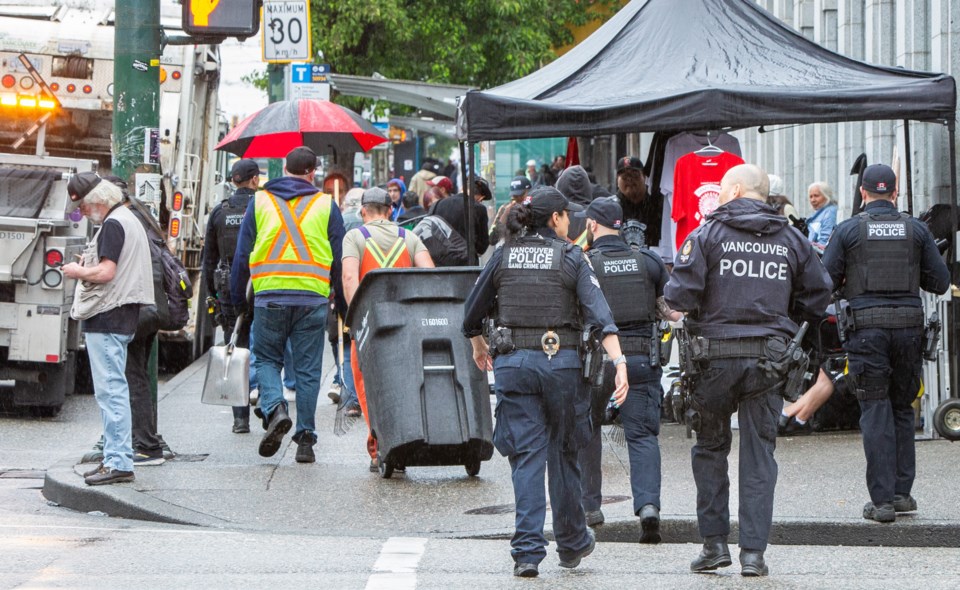The Vancouver Police Department is on track to now spend $2 million in overtime costs — more than the $1 million projected in June — by the end of the year on escorting city crews as they continue to clean and clear East Hastings Street sidewalks.
In June, the Vancouver Police Board received a VPD budget report that said the department had already spent $530,000 in overtime for the officers’ time on the street. That tab put the VPD on track to spend at least $1 million by year’s end.
Now at $2 million, the overtime costs are expected to continue into 2025 and beyond as Mayor Ken Sim and his ABC Vancouver majority council have committed to ensuring the sidewalks on East Hastings Street don’t become an encampment again.
The VPD’s overtime costs for 2024 were an issue for council Tuesday, which approved $11.2 million in “overages” mainly related to overtime incurred for protests and demonstrations, bylaw enforcement for encampments and work in the entertainment districts.
The tab also included costs of replacing equipment, body armour, legal costs for ongoing files and higher costs associated with security of the Tactical Training Centre, according to a city staff report.
Protest costs alone are projected to be close to $4 million this year.
'It's going to cost money'
In addressing council, Police Chief Adam Palmer said the job of escorting city crews on East Hastings is “not a core service of the police.” In fact, police stopped escorting crews in July 2022, which was four months before Sim got elected.
“We mentioned that we’re going to go over budget on it, and were told there would be funding for it,” said Palmer, who described the work on East Hastings as a city project.
“But now it’s year-end, and looks like we’re over budget. But we told you all along that if you want us to help out with that, then it’s going to cost money.”
Coun. Pete Fry asked Palmer how the city could get ahead of the overtime costs.
The chief referenced a Sept.16 press conference with the mayor regarding involuntary care for people who are at a high risk to themselves or others in the community, where they would be better served by medical professionals in a facility.
“You need to push the provincial government on mandatory care, involuntary care, compassionate care — whatever phrase you want to use,” said Palmer, noting the high call load for police and other emergency services for people in a mental health crisis.
“Those people cannot survive well on the street, and they are at a risk to other people. So that has to be taken care of.”
A recent report to the police board showed apprehensions by police using Section 28 of the Mental Health Act totalled 1,854 over the first nine months of this year. Of that total, 440 involved people who were apprehended more than once in the last four years.
Fire chief's order
The ramped-up efforts on East Hastings Street stem from Fire Chief Karen Fry’s order in July 2022 that called for all tents and structures to be removed from sidewalks along the strip because of “numerous urgent safety concerns,” a city news release said at the time.
Large sections of sidewalks in the Main and Hastings area were increasingly being populated by people in tents and other structures, with Fry concerned about a fire breaking out along the strip.
Fast forward to April 2023 and the ABC Vancouver-led council announced its support for a city-led operation to ramp up the removal of tents and structures. The first day and subsequent week saw a heavy police presence on the strip.
The police’s current role on East Hastings is in contrast to the position the department took in July 2022 when Kennedy Stewart was mayor. That’s when the VPD stopped escorting city crews.
Officers were present to reduce or stop confrontations with people on the street, many of whom are engaged in drug use, in a mental health crisis, or both. Violence and erratic behaviour are common along the strip, as police reports show.
'A huge drain on resources'
Deputy Chief Howard Chow told the police board in July 2022 that city staff and the public — via a council meeting — were informed eight months previous that police would stop escorting city crews.
Chow said escorting city crews required two to four officers twice a day, seven days a week.
“So it's a huge drain on resources in terms of the requirement for that,” he told the board. “Nowhere else in North America do you see this sort of thing where we’re escorting engineering or sanitation and cleaning streets.”
While Chow cited resources as a reason for pulling back on that work, he also said the decision was based on feedback from the provincial review of the Police Act, where other non-police options were recommended to respond to social issues involving drug addiction, poverty and mental illness.
“We're still working very closely with the city and helping to ensure that public safety issues are taken care of,” he said. “We’ve said it all along, that if there's a call for service, or a reason for police to be there, we will absolutely still be there [on East Hastings].”
Meanwhile, Sim remains steadfast in his belief that clearing East Hastings was the right move, telling Glacier Media several times since the ramped-up effort in April 2023 that “we’re not letting up.”
City council will meet Dec. 10 to discuss and likely finalize the city’s overall operating and capital budgets. The VPD is seeking an operating budget of $434 million for 2025.



